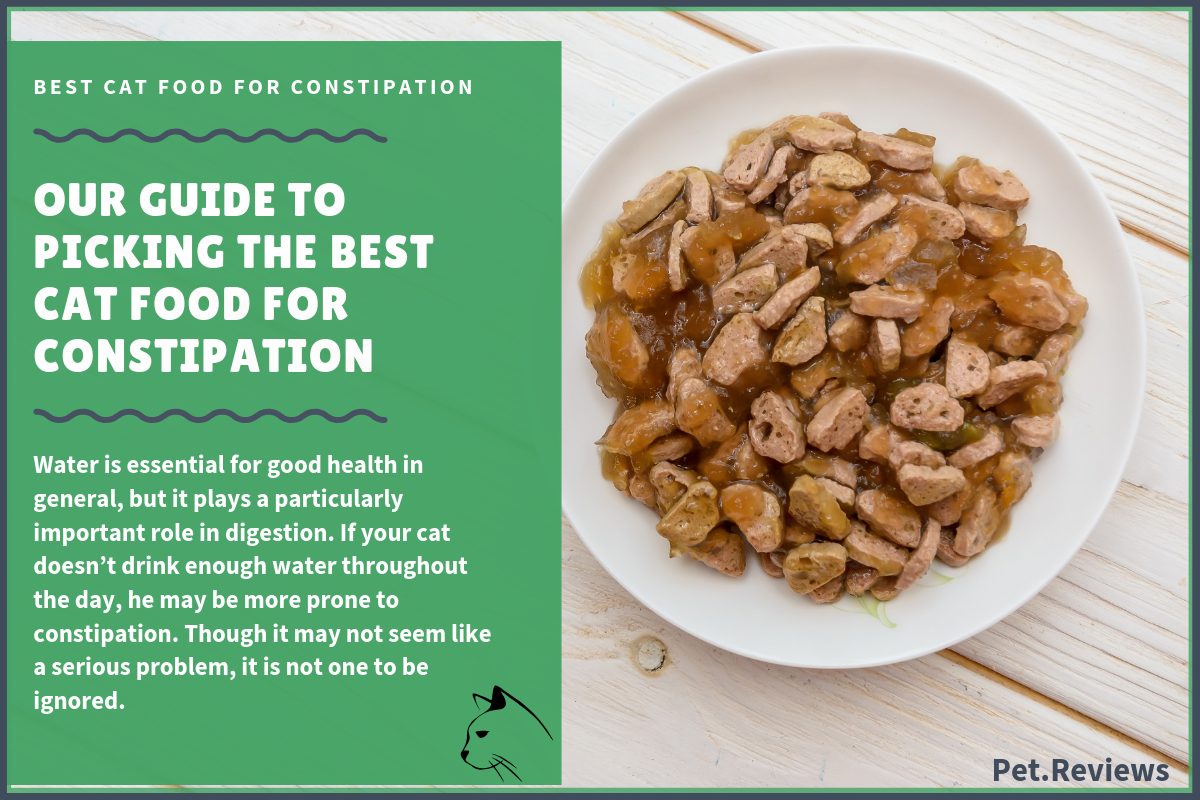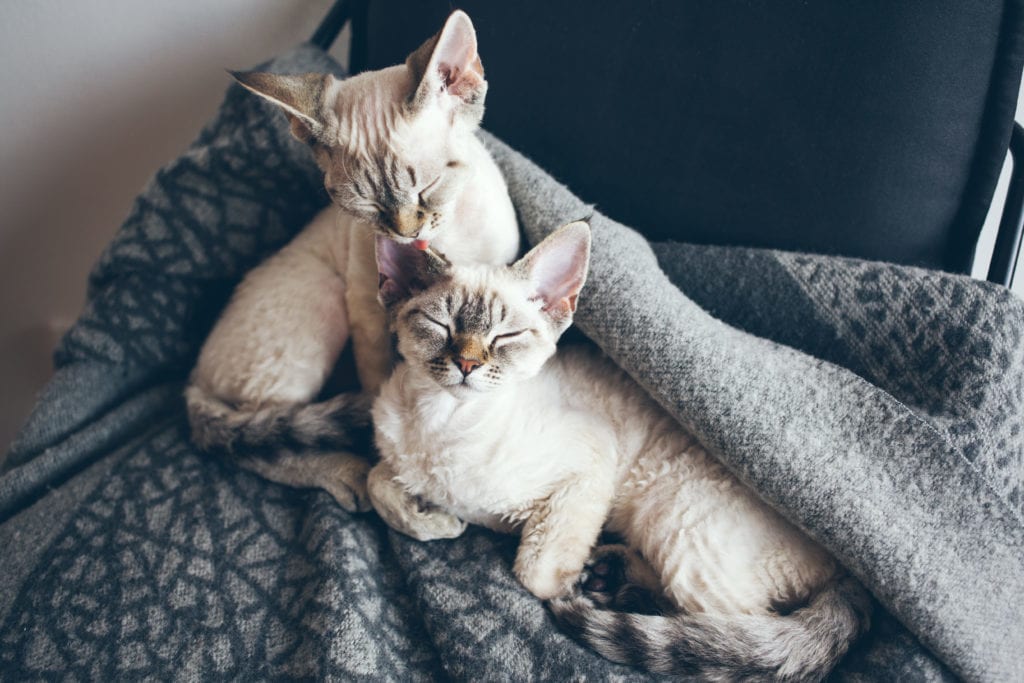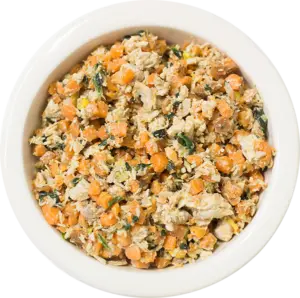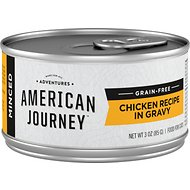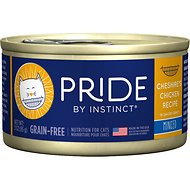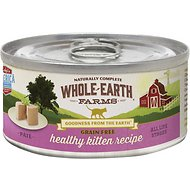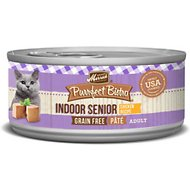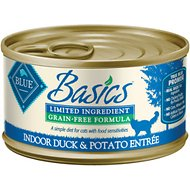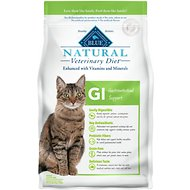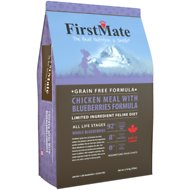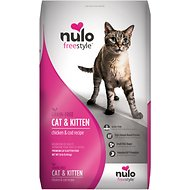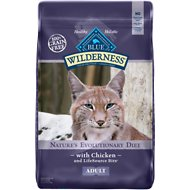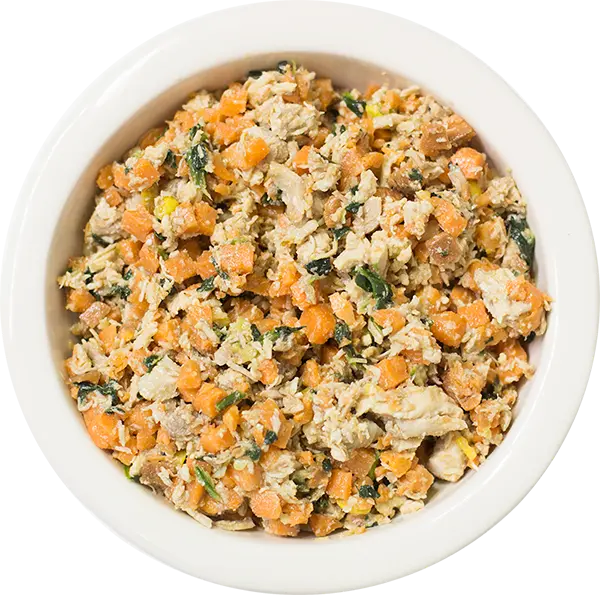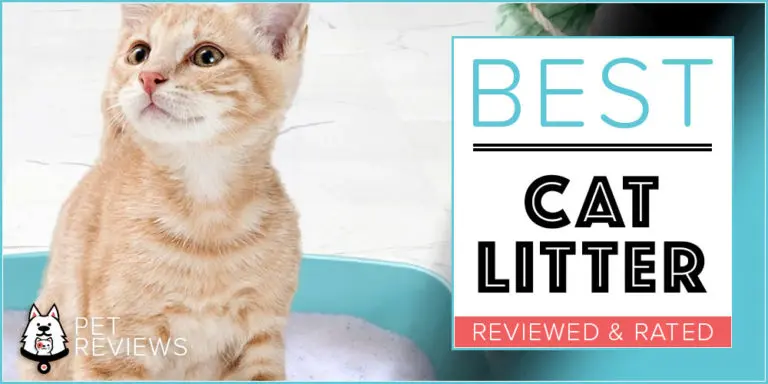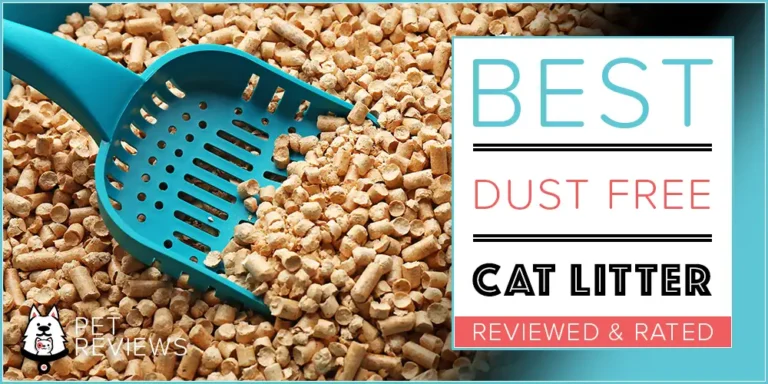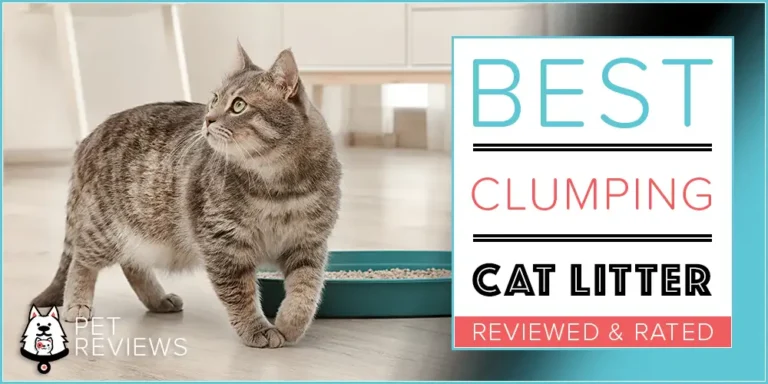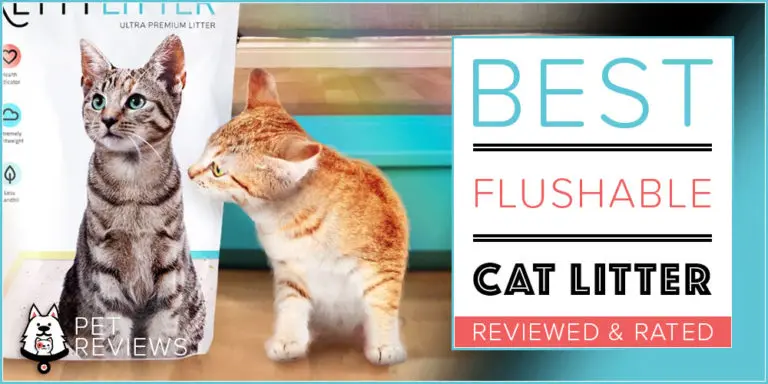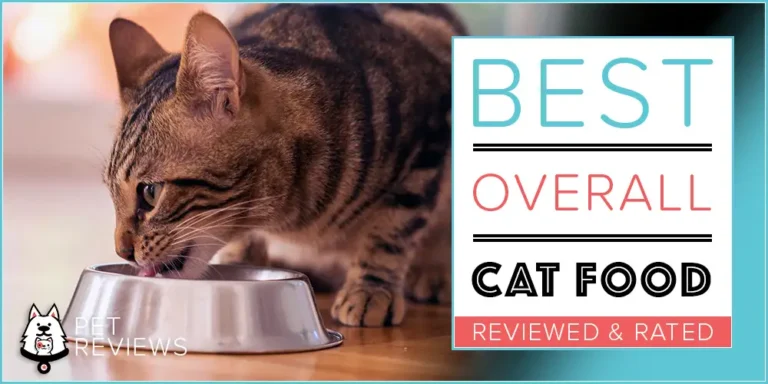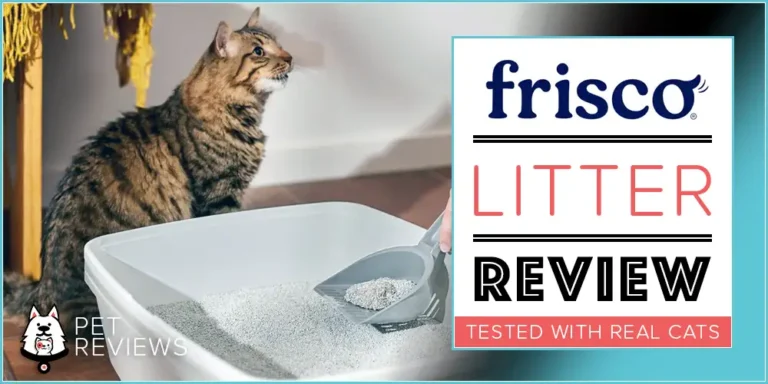Best Cat Food for Constipation : Top 10 Wet and Dry Recipes in 2024
Quick Guide
- What is the Best Cat Food for Constipation?
- What Are the Symptoms and Causes of Constipation in Cats?
- Home Remedies and Treatment Options for Constipation
- What to Look for in a Cat Food for Constipation
- The Top 10 Best Cat Foods for Constipation
- Smalls Fresh Food
- American Journey Minced Chicken Recipe in Gravy Grain-Free Canned Cat Food
- Nature’s Variety Pride Instinct Grain-Free Cheshire’s Chicken Recipe Canned Food
- Whole Earth Farms Grain-Free Healthy Kitten Pate Recipe Canned Food
- Merrick Purrfect Bistro Indoor Senior Chicken Recipe Canned Cat Food
- Blue Buffalo Basics Limited Ingredient Grain-Free Indoor Duck & Potato Canned Food
- 4 More Top-Rated Cat Foods for Constipation
- Frequently Asked Questions
Cats have a reputation for not drinking a lot of water.
Water is essential for good health in general, but it plays a particularly important role in digestion. If your cat doesn’t drink enough water throughout the day, he may be more prone to constipation. Though it may not seem like a serious problem, it is not one to be ignored.
Constipation in cats is not normal or healthy. Not only can it cause your cat discomfort, but if it becomes a chronic issue, it can lead to serious consequences including surgery.
It is your duty as a cat owner to understand and provide for your cat’s needs – this includes helping him maintain healthy and regular digestion. If your cat has already developed constipation, you should talk to your veterinarian to determine the severity of the issue and to discuss treatment options.
In addition to following your vet’s advice, you may want to think about switching your cat to a cat food designed to treat or prevent constipation. Keep reading to learn more about this issue in cats and to see our top picks for the best cat food for constipation.
What is the Best Cat Food for Constipation?
- Smalls Fresh Cat Food
- American Journey Minced Chicken Recipe in Gravy – Most Affordable
- Nature’s Variety Pride by Instinct Grain-Free Minced Sherlock’s Salmon Recipe Wet Canned
- Whole Earth Farms Grain-Free Healthy Kitten Pate Recipe Canned Food
- Merrick Purrfect Bistro Indoor Senior Chicken Recipe Canned Cat Food
- Blue Buffalo Basics Limited Ingredient Grain-Free Indoor Duck & Potato Canned Food – Most Popular
- Blue Buffalo Natural Veterinary Diet GI Gastrointestinal Support Grain-Free Dry Food
- FirstMate Chicken Meal with Blueberries Formula LID Grain-Free Dry Food
What Are the Symptoms and Causes of Constipation in Cats?
Occasional constipation is something that affects humans as well as animals. Though it may not seem like a big problem, recurrent episodes of constipation in cats can lead to problems like enlargement of the colon and impaction. Not only can these consequences be unpleasant, but they may require surgery.
So, how do you prevent constipation in cats?
The first thing you need to learn is how to identify the signs of constipation in cats. Once you realize that your cat is backed up, you can take a closer look at determining the underlying cause so you can remedy it and reverse the issue.
Here are some of the most common signs of constipation in cats:
- Defecating less often than usual
- Straining to defecate
- Crying out in pain during defecation
- Small, hard, dry stools
- Stools covered in blood or mucus
- Frequent trips to the litter box
- Straining without defecating
- Signs of abdominal pain
- Loss of appetite or weight loss
- Lethargy or lack of energy
- Vomiting
- Lack of grooming behavior
Now that you have a better understanding of how to identify the signs of constipation in cats, you may be wondering about the causes. Everything from dehydration to the ingestion of foreign objects could be responsible for your cat’s problem, so take the time to consider each option carefully.
Here are some of the most common causes of constipation in cats:
- Dehydration – This is one of the most common causes of constipation in cats and also the easiest to prevent and to remedy.
- Lack of Fiber – Though cats have a limited ability to digest plant matter, fiber in the diet is essential for helping food move through the digestive tract properly.
- Ingesting Foreign Objects – In some cases, constipation could be the result of a physical obstruction in the cat’s digestive system resulting from the ingestion of a foreign object.
- Colon Obstruction – If an obstruction isn’t caused by the ingestion of a foreign object, it could be an obstruction of the colon caused by a hernia or tumor.
- Hairballs – Cats spend a lot of time grooming and, in doing so, they end up ingesting a fair amount of hair. Grooming your cat more often and increasing the fiber content of his diet can help with this particular problem.
- Side Effects – Some medications come with a side effect of constipation – stopping the medication or adding a fiber supplement might help.
- Neurological Disorder – In some cases, neurological diseases can lead to problems with the function of your cat’s digestive tract, resulting in constipation.
- Obesity – Being overweight or obese can affect your cat’s body in many ways, including constipation and other symptoms of gastrointestinal upset.
Home Remedies and Treatment Options for Constipation
When it comes to treating constipation in cats, there are two different ways you can go. One option is to try at-home cat constipation remedies, and the other is veterinary intervention methods.
If your cat is severely constipated or if it is a chronic issue, your veterinarian might recommend one of several intervention methods. Medication is sometimes prescribed to improve the function of the large intestine, boosting its ability to move food through the digestive tract. Another option is manual evacuation of the bowels to remove an obstruction. When the obstruction is severe or life-threatening, this might become a surgical problem.
In cases where your cat’s condition is still stable, or in cases where you’re trying to prevent constipation from recurring, at-home cat constipation remedies are a good option.
Here are some of the best home remedies for cat constipation:
- Increased water consumption. Many cats don’t like to drink water unless it is fresh, so try setting up a pet fountain to keep your cat’s water fresh.
- Feeding canned pumpkin. Canned pumpkin (not pumpkin pie filling) is very high in fiber and a safe, gentle way to boost your cat’s digestion at home.
- Using an over-the-counter fiber supplement. As long as you have your vet’s approval, you can try using a fiber supplement like Metamucil – add 1 to 4 teaspoons (depending on your cat’s weight) to your cat’s food every 12 to 24 hours.
- Increasing your cat’s activity level. Sometimes a little exercise is all your cat needs to get things moving so break out the laser pointer and ribbon toy and get your cat to play.
- Use a little wheat bran. Though wheat ingredients have little nutritional value in cat food, wheat bran can be used as a fiber supplement to help relieve constipation in cats.
- Try a stool softener like Miralax. Though it is designed for human use, you can use a little Miralax with your vet’s approval – try ¼ teaspoon once a day in your cat’s wet food.
The remedies above are largely designed to increase the bulk of your cat’s stool so it can move through his digestive tract more smoothly. Once you’ve resolved your cat’s constipation, you may want to think about ways to prevent it in the future. Keep reading to learn more about what to look for in the best cat food for constipation.
What to Look for in a Cat Food for Constipation
If your cat is suffering from constipation, you should talk to your veterinarian about potential interventions. At the very least, your veterinarian will be able to assess your cat’s current condition to tell you the severity of the condition.
In cases where your cat is only mildly constipated or constipated but is otherwise healthy, you might be able to remedy the problem at home. If your cat seems to be prone to frequent constipation, it might be time to take a closer look at his diet. Increasing the fiber and moisture content of your cat’s food could improve his digestion and help prevent constipation in the future.
Here are some things to look for in a cat food for constipation:
- Moisture Content – Most dry cat food has a moisture content around 10% while canned food is closer to 80%. You can still feed your cat dry food but consider moistening it with water or chicken broth or add some canned food or a wet food topper to boost his moisture intake.
- High in Fiber – Increasing the fiber content of your cat’s diet is important, but avoid diets made with too much carbohydrate. Sources of fiber you may see in cat food include pumpkin, psyllium powder, ground flaxseeds, and powdered cellulose.
- Digestible Ingredients – Digestibility is important when it comes to your cat’s food, and whole-food ingredients are more digestible than fillers and additives. Your cat’s food should be processed as little as possible to make sure his body can break it down easily.
- Prebiotics and Probiotics – Supplements to support your cat’s digestion are important. Prebiotic fibers provide food for beneficial bacteria in the digestive tract which help break down food.
In addition to these things, remember that your cat is an obligate carnivore, so meat should be the foundation of his diet. Animal proteins like poultry, meat, and fish are much more biologically valuable for your cat than plant proteins. You may find, however, that many pet foods contain plant proteins like pea protein and potato protein. This generally isn’t a problem as long as they are used as supplemental proteins and are not the primary ingredient.
Another thing to consider when shopping for cat food, in general, is that the quality of the ingredients matters. When your cat is prone to constipation, his digestive system is already a little sensitive so you may want to consider a limited ingredient diet to further reduce the risk of sensitivity or allergies.
Now that you know what to look for when shopping for dry or canned cat food for constipation, you’re ready to hit the pet store! If you’re still not quite sure, check out our top 10 picks below.
The Top 10 Best Cat Foods for Constipation
Improving your cat’s digestion is the key to relieving constipation and preventing it in the future. As you know by now, the best cat food for constipation is rich in moisture and fiber but still made with healthy, wholesome ingredients to ensure complete and balanced nutrition. Your cat’s nutrition is always the top priority, so take everything else you’ve learned here with that grain of salt.
Here are our top 10 picks for the best high fiber wet cat food for constipation as well as some dry cat food options you can consider:
| Our 2024 Picks: Best Cat Food for Cats with Constipation | |||
Smalls Fresh Food
|
CHECK PRICE | ||
American Journey Minced Chicken Recipe In Gravy Grain-Free
|
CHECK PRICE | ||
Nature’s Variety Pride Instinct Grain-Free Cheshire’s Chicken
|
CHECK PRICE | ||
Whole Earth Farms Grain-Free Healthy Kitten Pate
|
CHECK PRICE | ||
Merrick Purrfect Bistro Indoor Senior Chicken Recipe Canned
|
CHECK PRICE | ||
Blue Buffalo Basics Limited Ingredient Grain-Free Indoor
|
CHECK PRICE | ||
Blue Buffalo Natural Veterinary Diet GI Gastrointestinal Support
|
CHECK PRICE | ||
FirstMate Chicken Meal With Blueberries Formula LID
|
CHECK PRICE | ||
Nulo Freestyle Chicken & Cod Recipe Grain-Free Dry Cat
|
CHECK PRICE | ||
Blue Buffalo Wilderness Chicken Recipe Grain-Free Dry Cat Food
|
CHECK PRICE | ||
Smalls Fresh Food
Our Top Pick for the Best Cat Food for Constipation Overall: If you love your cat and want what’s best for him, that should extend to his diet. Smalls Fresh Food Delivery Service delivers freshly prepared cat food right to your door. All you have to do is fill out a profile for your cat online, choose from two protein-rich recipes, and start receiving monthly deliveries. Fresh food is not only rich in protein but also very high in moisture. This helps support your cat’s digestion and, in combination with high-quality ingredients, helps reduce the size of his stools to make his digestion more efficient. Though this option is more expensive than dry cat food, it is one of the healthiest options out there, and you can save money with a multi-pet discount.
- Pros: Fresh food delivered to your door, high in protein, two recipe options, high in moisture content, fresh, wholesome ingredients, multi-pet household discount
- Cons: Expensive to feed as a staple diet, only two protein options to choose from
American Journey Minced Chicken Recipe in Gravy Grain-Free Canned Cat Food
Our Top Pick for the Best Affordable Cat Food for Constipation: Owning a pet is not cheap, but just because you want to save money doesn’t mean you can’t still give your cat something worth eating. This American Journey Minced Chicken Recipe in Gravy Grain-Free Canned Cat Food is a great option in general, but it is also a decent canned cat food for constipation. Like any cat food worth its salt, this recipe starts with a high-quality source of animal protein as the main ingredients and is supplemented with healthy fats for skin and coat support. This recipe contains a whopping 82% moisture which is great for digestion and is supplemented with flaxseed and fresh berries to boost the fiber content.
- Pros: Affordable but high quality, real animal protein as main ingredient, grain-free digestible carbohydrates, high moisture content (82%), healthy fats for skin and coat, fiber supplements
- Cons: Could be higher in fiber content, some cats are sensitive to chicken ingredients, no probiotics
Nature’s Variety Pride Instinct Grain-Free Cheshire’s Chicken Recipe Canned Food
Our Top Pick for the Most Popular Cat Food for Constipation: The Nature’s Variety brand is known for producing a wide range of high-quality products, and this recipe is a high fiber wet cat food for constipation. Nature’s Variety Pride Instinct Grain-Free Cheshire’s Chicken Recipe Canned Food features fresh chicken as the main ingredient with fresh fruits and vegetables to provide natural sources of key nutrients. It contains a whopping 3% fiber with 80% moisture, making it a great option for digestive support. This recipe is supplemented with fiber-rich ingredients as well – things like cranberries, pumpkin, and broccoli. Overall, it is an excellent source of quality nutrition and comparable in price to other high-quality brands.
- Pros: Whole-food ingredients, real chicken as main ingredient, fresh fruits, and vegetables, grain-free for digestibility, high in fiber and moisture, chelated minerals, palatable texture and flavor
- Cons: Some cats are sensitive to chicken ingredients, no probiotic supplements
Whole Earth Farms Grain-Free Healthy Kitten Pate Recipe Canned Food
Our Top Pick for the Best Cat Food for Kittens with Constipation: Getting your kitten off to a healthy start is important if you want him to live a long and happy life. This Whole Earth Farms Grain-Free Healthy Kitten Pate Recipe Canned Food is a wonderful option because it is protein-rich and made from high-quality ingredients. Not only is this recipe a great source of balanced nutrition for kittens, but it also has features that make it a great canned cat food for constipation. Though it features fresh chicken as the main ingredient, this cat food also contains several sources of supplemental fiber such as ground flaxseed and dried alfalfa meal. Overall, it provides 3% crude fiber with 78% moisture and plenty of beneficial vitamins and minerals as well.
- Pros: Real chicken as main ingredient, rich in fiber and moisture, grain-free digestible carbohydrates, nutritionally balanced for kittens, chelated minerals, supplemental fiber sources, affordable price
- Cons: Contains some plant protein (alfalfa meal), no probiotic supplements
Merrick Purrfect Bistro Indoor Senior Chicken Recipe Canned Cat Food
Our Top Pick for the Best Cat Food for Seniors with Constipation: As your cat gets older, his metabolism slows down and so does his body. You may also find that your senior cat’s digestion slows down, making him more prone to constipation. This Merrick Purrfect Bistro Indoor Senior Chicken Recipe Canned Cat Food is a great high fiber cat food for constipation that is uniquely formulated for senior cats. This recipe features fresh chicken as the main ingredient with grain-free carbohydrates to ensure digestibility. Overall, it provides 2.5% crude fiber and 81% moisture, and it is supplemented with essential vitamins and minerals to ensure complete and balanced nutrition.
- Pros: Formulated for senior cats, fresh chicken as main ingredient, grain-free digestible carbohydrates, rich in fiber and moisture, blend of omega fatty acids for skin and coat
- Cons: Contains some plant protein (pea protein), main source of fat is plant-based (flaxseed oil)
Blue Buffalo Basics Limited Ingredient Grain-Free Indoor Duck & Potato Canned Food
Our Top Pick for the Best Cat Food for Allergies and Constipation: If your cat is prone to food allergies and sensitivities, he may already be dealing with some digestive issues. This Blue Buffalo Basics Limited Ingredient Grain-Free Indoor Duck & Potato Canned Food is a great option to support his digestion in several ways. Not only is it grain-free and made with a novel source of protein and carbohydrate to reduce the risk of food allergies and sensitivities, but it contains several sources of supplemental fiber and is rich in moisture. This recipe contains a limited number of main ingredients but features plenty of fresh fruits and vegetables as well as beneficial supplements to ensure complete and balanced nutrition for your cat.
- Pros: Limited number of main ingredients, novel protein and carbohydrate, grain-free for digestibility, fresh fruits, and vegetables, blend of omega fatty acids, rich in fiber and moisture
- Cons: Contains carrageenan as a thickener, could be higher in fiber content
4 More Top-Rated Cat Foods for Constipation
If none of the cat foods reviewed above seem like the right fit, don’t worry. There are still many other cat foods out there! Below you’ll find four more top-rated cat foods for constipation in the dry cat food category. Remember, moisture is important but if your cat prefers dry food, choose one of these high fiber cat foods and add moisture to his diet:
Blue Buffalo Natural Veterinary Diet GI Gastrointestinal Support Grain-Free Dry Food
If your cat’s constipation is related to a digestive disorder, your veterinarian may recommend a prescription diet like this Blue Buffalo Natural Veterinary Diet GI Gastrointestinal Support Grain-Free Dry Food. Unlike many prescription diets, this formula is made with only high-quality, natural ingredients without any artificial additives or fillers. It features real animal protein as the main ingredient with digestible grain-free carbohydrates and plenty of supplemental fiber. This recipe provides a whopping 36% protein and 14% fat with 5% fiber and 10% moisture. It is supplemented with chelated minerals to ensure optimal nutrient absorption as well as probiotics for digestive support.
- Pros: Veterinary diet for digestive issues, real animal protein, grain-free digestible carbohydrates, plenty of supplemental fiber, chelated minerals, probiotics, 5% crude fiber content
- Cons: Expensive to feed as a staple diet, requires a prescription to purchase, contains some plant proteins (pea protein)
FirstMate Chicken Meal with Blueberries Formula LID Grain-Free Dry Food
For cats with food allergies and sensitivities, digestibility is particularly important. Even if your cat doesn’t have digestive issues other than constipation, however, this FirstMate Chicken Meal with Blueberries Formula LID Grain-Free Dry Food would still be a great choice. This recipe features all-natural ingredients including real chicken, potatoes, and blueberries. Other than that, most of the ingredients are chelated minerals, vitamin supplements, or other beneficial add-ons. Overall, this recipe is highly digestible, rich in fiber and protein, and nutritionally balanced for all life stages.
- Pros: Limited ingredient diet, high-quality natural ingredients, real animal protein, fresh blueberries, rich in protein and fiber, supplemented with chelated minerals and prebiotics, balanced for all life stages
- Cons: Fairly expensive to feed as a staple diet, some cats are sensitive to chicken ingredients
Nulo Freestyle Chicken & Cod Recipe Grain-Free Dry Cat & Kitten Food
If you’re looking for a healthy, high-quality cat food that will support your cat’s digestion as well as his overall health, try this Nulo Freestyle Chicken & Cod Recipe Grain-Free Dry Cat & Kitten Food. This recipe is formulated for kittens as well as adult cats, so you don’t have to upset your cat’s digestion making a transition from kitten to adult food. It features four high-quality sources of animal protein with digestible grain-free carbohydrates and plenty of omega fatty acids. It is loaded with natural sources for key nutrients but also contains chelated minerals to ensure optimal nutrient absorption. Overall, it provides 40% protein and 20 % fat with 4% fiber and 10% moisture.
- Pros: Formulated for cats and kittens, grain-free digestible carbohydrates, multiple premium animal proteins, rich in omega fatty acids, beneficial supplements for digestive support
- Cons: Some cats are sensitive to chicken ingredients, peas can cause some cats digestive upset
Blue Buffalo Wilderness Chicken Recipe Grain-Free Dry Cat Food
Regardless of his constipation, your cat’s nutrition is of the utmost priority. This Blue Buffalo Wilderness Chicken Recipe Grain-Free Dry Cat Food is a great option because it is formulated with the idea that cats are obligate carnivores and meat is the most important ingredient. This recipe features premium animal proteins like chicken and menhaden fish meal with grain-free carbohydrates for digestibility. It is loaded with supplemental sources of fiber and contains dried fermentation products for probiotic support as well. This recipe contains chelated minerals for optimal nutrient absorption, and it is a rich source of protein and fat, providing 40% and 18% respectively. Overall, this recipe is designed to mimic your cat’s natural evolutionary diet which helps improve its digestibility.
- Pros: High-protein recipe, grain-free digestible carbohydrates, supplemental sources of fiber, rich in omega fatty acids, dried fermentation products for probiotic support, chelated minerals
- Cons: Contains plant proteins (pea protein), could be higher in moisture (only 9%)
Frequently Asked Questions
- How can I soften my cat’s stool? – If your cat is having trouble passing stool, you may want to try a stool softener. For a natural option, try a few tablespoons of canned pumpkin to boost your cat’s fiber intake. If pumpkin doesn’t do the trick, an over-the-counter fiber supplement like Metamucil or a stool softener like Miralax might work. Just remember that your cat’s body weight is much lower than a human’s, so dose it appropriately. For Metamucil, you need about 1 to 4 teaspoons daily and for Miralax only about ¼ teaspoon.
- What can I give my cat for fiber? – Generally speaking, fruits and vegetables are rich sources of fiber, but some contain more than others. Pumpkin is one of the best natural sources of fiber, and its canned form is easy to come by and easy to administer. Other options for fiber include ground flaxseed, wheat bran, psyllium husk, and powdered cellulose. If you don’t have these on hand, you can pick up some Metamucil or another similar over-the-counter fiber supplement at your local drug store.
- Can dry cat food cause constipation? – Dry cat food does not directly cause constipation, but its relatively low moisture content can be a contributing factor. Most dry cat foods contain 10% moisture while canned food contains 78% to 80% moisture. If you suspect that dehydration is linked to your cat’s constipation, consider switching over to a canned food diet or start adding some wet food to your cat’s dry food once a day.
- Is it normal for a cat not to poop every day? – Every cat is different and, as a cat owner, you should be familiar with your cat’s habits so you can tell when something is wrong. Generally speaking, it is normal for a cat to defecate about once a day. If you notice that your can’t hasn’t used the litter box yet on any certain day, however, you shouldn’t immediately panic. Changes in your cat’s stool are, however, a cause for concern. If your cat’s stool changes in color, consistency, or frequency, you might want to talk to your vet.
- What is a natural laxative for cats? – A laxative is simply something that helps speed the digestive process along. Natural laxatives that work well for cats include high-fiber supplements like canned pumpkin, wheat bran, or ground flaxseeds. You can also try over-the-counter fiber supplements like Metamucil and stool softeners like Miralax. Just make sure you have your vet’s guidance for using human products on pets.
As much as you might like to avoid the litter box, your cat’s bowel movements are an indication of his health and wellness. If something changes with his stools, it’s a good indication that something might be wrong, and you should think about calling your vet.
Cats are more prone to constipation in general because they don’t tend to drink a lot of water. As a cat owner, it’s your job to provide for your cat’s needs, and that means finding a way to keep him hydrated. Take what you’ve learned here and start taking steps to increase the moisture and fiber content of your cat’s diet to prevent constipation.
If you’re not sure where to start, try switching to one of the best high fiber wet cat food or dry cat food options we’ve reviewed above. When feeding your cat dry food, remember to take other steps to boost his moisture intake by adding some wet food or a food topper once a day.

